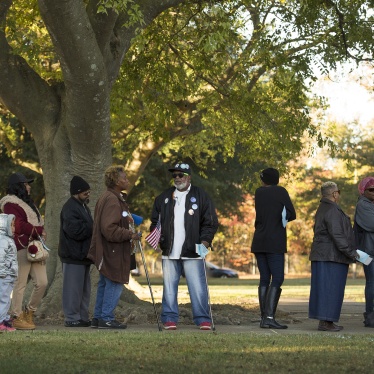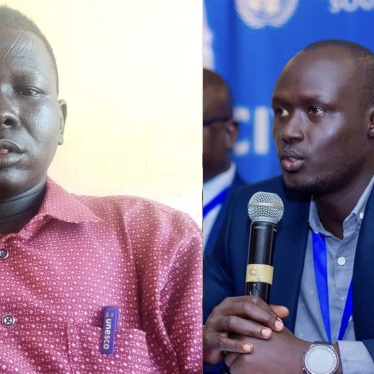Human Rights Watch urges Congress to enact S. 1194, the Mentally Ill Offender Treatment and Crime Reduction Act of 2004. The Senate unanimously passed this bill on October 27, 2003. Enactment of this legislation followed by sufficient levels of appropriations could help catalyze important and cost-effective reforms across the country in the way the criminal justice system responds to people with mental illness.
June 22, 2004
Dear Representative:
We write to urge you to enact S. 1194, the Mentally Ill Offender Treatment and Crime Reduction Act of 2004. The Senate unanimously passed this bill, introduced by Sen. DeWine, on October 27, 2003. Enactment of this legislation followed by sufficient levels of appropriations could help catalyze important and cost-effective reforms across the country in the way the criminal justice system responds to people with mental illness.
In the United States today, jails and prisons have become de facto mental health institutions. Sheriffs, corrections professionals, police, prosecutors, defense attorneys and criminal justice advocates agree that this is a function they are poorly equipped to serve. Federal support for collaborative mental health and criminal justice efforts as provided for under this legislation would help reduce the unnecessarily high level of involvement of the mentally ill in the criminal justice system and also enable that system to respond better to those mentally ill offenders whose crimes warrant incarceration.
Last year, Human Rights Watch released a report, “Ill Equipped: U.S. Prisons and Offenders with Mental Illness,” which focused on the staggering proportions of prisoners who have serious mental illnesses, the poor treatment they receive in prison, and the profound misalignment between the goals and culture of mental health services and the goals and culture of corrections.
As the report documents, somewhere between one in five and one in six prisoners is mentally ill, and the number of mentally ill in prison greatly exceeds the number in mental health hospitals. Prisons and jails, in fact, have become the nation’s default mental health system.
Unfortunately, it is a function they are ill equipped to serve. While there have been considerable improvements in prison mental health services over the last couple of decades, the soaring number of mentally ill inmates has outpaced the progress. Prisons across the country lack sufficient mental health staff and facilities to provide appropriate care for the two to three hundred thousand prisoners who suffer from serious mental illness, including schizophrenia, bipolar disorder, and major depression.
As a result, incarcerated prisoners often receive little or no mental health treatment. Moreover, mentally ill prisoners confront prison regimes and rules that do not accommodate mental illness. Prison staff, for example, punish the mentally ill for displaying symptoms of their illness, such as banging their heads on the wall, covering themselves in feces, self-mutilating and even attempting suicide. Many prisoners with mental illness end up in segregated confinement where the isolation and idleness can push them into acute psychosis.
The high rate of incarceration of the mentally ill is a consequence of under-funded, disorganized, and fragmented community mental health services. Neither private insurance nor public benefits enable all those who need mental health services to obtain them. The difficulty of accessing treatment is particularly acute for those with mental illness who are poor, homeless, or struggling with substance abuse problems. If they do commit a crime, like anyone else they are swept into the criminal justice system. Punitive mandatory sentencing policies preclude judges from exercising sentencing discretion to provide alternatives to incarceration, even for low-level nonviolent offenders.
The Mentally Ill Offender Treatment and Crime Reduction Act of 2004 does not purport to address all of the causes and consequences of the incarceration of offenders with mental illness. Nevertheless, it could provide much-needed support for initiatives to reduce the unnecessary incarceration of low-level nonviolent offenders with mental illness as well as to ensure that those mentally ill offenders who are incarcerated receive appropriate mental health services. For these reasons, we urge you to support S. 1194.
Sincerely,
Jamie Fellner, Esq.
Director, U.S. Program






